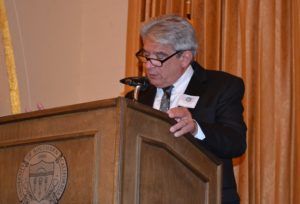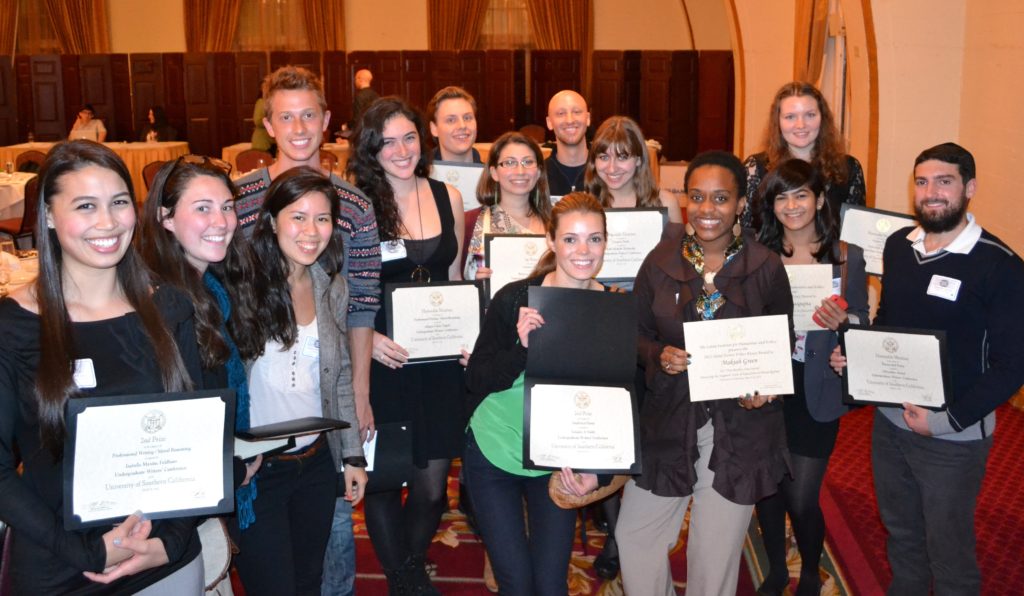9th Annual Undergraduate Writers’ Conference
Wednesday, March 28, 2012
Conference Director: Caley O’Dwyer Feagin
Keynote Speaker: Mark Richard
2012 Program
Analytical Essay
Researched Essay
Professional Writing/Moral Reasoning
Creative Work
USC Levan Institute
Photos
Analytical Essay (104 submissions)
Honorable Mention
Michael Onorati
An Invader of Privacy: Gene Hackman in “The Conversation”
Michael Onorati’s analysis of Gene Hackman’s physical performance in the 1974 film The Conversation is in its close attention to detail. Thoroughly exploring the role of gesture in the film, Onorati argues that Hackman’s performance of Caul’s self-protective posturing illuminates ways in which violations of privacy can be violently dehumanizing.
2nd Prize
Lindsey Smith
Zozobra: The Reassuring Death of the Other
Smith’s analysis of Fiestas de Santa Fe—an autumn celebration that includes a ritual sacrifice of the paper mache figure, Zozobra—demonstrates a remarkable awareness of the multiple historical and cultural contexts from which this celebration emerges. However, despite the complex, multicultural history of the festival, Smith argues that the celebration has come to function as a form of entertainment that depends on a ritualized sacrifice of the “Other.” In operating as a form of both entertainment and sacrifice, Smith concludes that Fiestas de Santa Fe illuminates the violence that inheres in the reproduction and accumulation of capital.
1st Prize
Nick Farmer
The Quirky Adventures of Margot and Her Little Pink Glove
Nick Farmer, in considering every minute detail of the visual imagery present in the film “The Royal Tenenbaums,” provides expert analyses of design motifs, costuming, and characters, ultimately arguing that the Tenenbaums’ visual appearance is representative of their past traumas. His diligent examination suggests the relationship between the characters’ appearance and their pasts is evidence of a trapped, arrested mental state. His meticulous style is a joy to read.
Researched Essay (107 submissions)
Honorable Mention
Alexander Gertel
The Need to Make Periodic Board Recertification Mandatory for ‘Grandfathered’ Specialists
Gertel traces the history of medical specialty board certification to explain how certain older medical practioners are exploiting a loophole in the certification process. Using extensive research—including doctor testimony—Gertel argues that failing to require all doctors to periodically recertify poses a significant health risk for patients. Throughout the essay Gertel is careful to acknowledge some of the potential objections to mandatory recertification, yet counters those objections insightfully and with well-reasoned evidence in support of his proposal.
Honorable Mention
Jasneet Aulakh
Blood for Blood: 1984 India
Aulakh weaves together a range of sources, including first-hand testimony, to create a compelling narrative of the political violence that consumed parts of India in the year 1984. Aulakh complicates the standard explanations for the violence by allowing victims the opportunity to speak for themselves in her work and by illuminating how different regions responded in different ways to the violent outbreaks. The cumulative result is an engaging, thought-provoking retelling of a crucial period in India’s history.
2nd Prize
Erik Peterson
Genocide, Identity, and the State: The Role of Societal Manipulation in Conflict
Erik Peterson’s essay catalogs the role of the Beligian colonial authorities in the Rwandan Genocide of 1994. The creation of disparate ethnic identities and the escalation of conflict is viewed through the lens of several analytical frameworks of international relations theory, as Peterson reminds us of the horrific consequences that can result from the corruption of a society by the external influence of a state.
1st Prize
Lauren Maldonado
On Piero della Francesca’s “Madonna del Parto”: Contextualizing the Modest Mediator and her role in Childbirth in Fifteenth-Century Italy
Maldonado’s essay is a riveting, in-depth view of a 15th century masterpiece, “Madonna del Parto” and its place in history. Thanks to meticulous research, a deft hand at writing, and keen insight into the fascination art lovers still have with the piece, we too are drawn into the circle and feel compelled to fly to Tuscany (immediately) to view the painting ourselves.
Professional Writing/Moral Reasoning (74 submissions)
Honorable Mention
Allegra Tepper
Mo’ Women, Mo’ Problems: How Showtime Found its Niche Among the Broads
The title of Allegra Tepper’s essay says it all: this is a spirited and informative read about the cable network Showtime’s successful strategy of creating content for and about real women. Tepper’s entertaining consideration of how Showtime challenged rival HBO for cable dominance by cornering the “strong woman market” is smart and sassy.
2nd Prize
Isabelle Feldhaus
Stopping Corporate Drivers of the Noncommunicable Disease Epidemic: Nestlé Supermarkets in Brazilian Slums
Isabelle Feldhaus documents the striking rise in noncommunicable diseases in third world countries and explores the financial, political, and cultural nuances of created epidemics through the particular case of Nestlé food conglomerate’s business practices in the slums of Brazil. This clearly written essay carefully builds its case that Nestlé aggressively targeted Brazilian villages as an untapped market and that government complicity was secured through donations and food programs. According to Feldhaus: “Nestlé promotes unhealthy diets in villages that were previously nutritionally self-sustainable,” which leads to increases in non-communicable disease. Citing examples of successful health education through song in Africa, Feldhaus proposes a similar campaign of cultural intervention for nutritional education in Brazil.
1st Prize
Nancy Benner
Are Chemicals Making Americans Fat? What You Should Know About the Obesogen Debate
In this engagingly written essay, Benner explores the intersection of science and consumerism in the form of obesogens, “industrial chemicals, found in common products Americans use every day, that may be contributing to the obesity epidemic.” Benner synthesizes a wide variety of sources—from Suzanne Somers and Dr. Oz to the CDC and academic studies—fairly portraying the perspectives of multiple stakeholders. The essay demystifies the role of the EPA and the FDA by comparing the regulatory standards of the US to the “precautionary principle” behind regulation in Canada and the European Union. Through this essay’s exploration of obesogens, complex connections between politics, business, and public health are rendered accessible and indeed fascinating to a non-scientific audience.
Creative Work (143 submissions)
Honorable Mention
Sarah Ingerson
UnPretty (poetry collection)
Here is a clearly articulated and utterly distinctive voice. Like Joan Didion, Ingerson has found a way to reckon with pain and despair in precise language, acid-tart humor, and cynical knowingness. The poems are about very familiar, potentially even clichéd, experiences—feeling out of place, teenage awkwardness, love gone wrong—but in every case, Ingerson breathes new life into her subject matter. Ingerson’s poems are rueful, lacerating, lucidly bitter, and funny as hell.
Honorable Mention
Ruth Madievsky
Up in Flames (short story)
“Up in Flames” is a dramatically mature piece of writing. Rich with embedded narrative cues, the story unfolds back-and-forth between present and past, thoughtfully simulating the circuitry and symbolic richness of memory itself as the protagonist struggles to save her family’s future by freeing herself from the grip of her past decision to give up a child for adoption. Madievsky’s narrative delivers a sophisticated exploration of the power of memory to orient us in our lives but also to keep us from moving forward.
2nd Prize
Brenda Yang
Anna’s Syndrome (short story)
Neurologists tell us that nothing in the sensory realm evokes memories the way that smells do. The problem in Taylor Friedman’s “Frozen Cherry Custard” is that the odors that haunt Evie Benny come from nowhere in the immediate world. These smells transport her from the tense realities of marital and parental life into scenes from her younger years. Friedman’s writing is taut, fluent and sophisticated, very much inside the world of her protagonist, and she has a rare quality for a young writer: she trusts her reader.
2nd Prize
Anthony DeCapite
The Divide (screenplay)
Anthony DeCapite writes with a deft and detailed assurance that immediately transports his readers to the desolate winter landscape of the mid-nineteenth century Rocky Mountains. His screenplay derives its emotional power from the richness and specificity of his cinematic vision. In his brief, devastating, and utterly convincing script, he provides profound commentary on conceptions of masculinity and of the relationships between fathers and sons.
1st Prize
Rebecca Kantor
Introducing…the Rapturous Rhonda Rhodes!
As Nabokov’s Humber Humbert describes his infatuation with Lolita, “It was love at first sight, at last sight, at ever and ever sight,” so too it is with Rhonda Rhodes, the protagonist of Rebecca Kantor’s playfully hyperbolic tale. Ms. Kantor’s smart, deeply enthusiastic narrative plays just at the edges of camp and is rapturous even in its darkness as it describes a young girl’s discovery of and subsequent unapologetic savoring of her own sexual appetites. Kantor’s Rhonda Rhodes is a heroine for a comic book devouring, post-girl-power generation, a swaggering, self-possessed black widow at the ripe age of fourteen.
USC Levan Institute Ethics Essay Contest
Ethics Essay Contest winners were also announced at the Writers’ Conference. Click here to view the winners.
Photos







